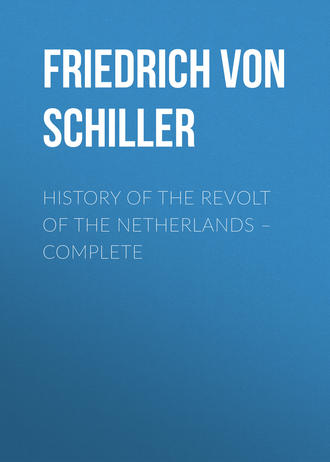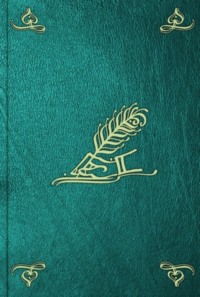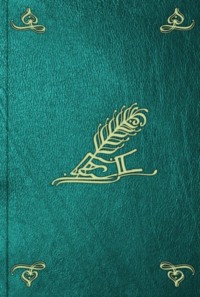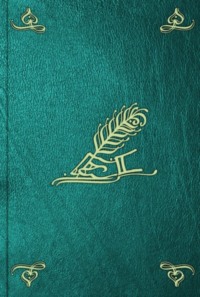 полная версия
полная версияHistory of the Revolt of the Netherlands – Complete
These, under the name of States, assembled as often as the wants of the province required it. Without their consent no new laws were valid, no war could be carried on, and no taxes levied, no change made in the coinage, and no foreigner admitted to any office of government. All the provinces enjoyed these privileges in common; others were peculiar to the various districts. The supreme government was hereditary, but the son did not enter on the rights of his father before he had solemnly sworn to maintain the existing constitution.
Necessity is the first lawgiver; all the wants which had to be met by this constitution were originally of a commercial nature. Thus the whole constitution was founded on commerce, and the laws of the nation were adapted to its pursuits. The last clause, which excluded foreigners from all offices of trust, was a natural consequence of the preceding articles. So complicated and artificial a relation between the sovereign and his people, which in many provinces was further modified according to the peculiar wants of each, and frequently of some single city, required for its maintenance the liveliest zeal for the liberties of the country, combined with an intimate acquaintance with them. From a foreigner neither could well be expected. This law, besides, was enforced reciprocally in each particular province; so that in Brabant no Fleming, in Zealand no Hollander, could hold office; and it continued in force even after all these provinces were united under one government.
Above all others, Brabant enjoyed the highest degree of freedom. Its privileges were esteemed so valuable that many mothers from the adjacent provinces removed thither about the time of their accouchment, in order to entitle their children to participate, by birth, in all the immunities of that favored country; just as, says Strada, one improves the plants of a rude climate by removing them to the soil of a milder.
After the House of Burgundy had united several provinces under its dominion, the separate provincial assemblies which, up to that time, had been independent tribunals, were made subject to a supreme court at Malines, which incorporated the various judicatures into one body, and decided in the last resort all civil and criminal appeals. The separate independence of the provinces was thus abolished, and the supreme power vested in the senate at Malines.
After the death of Charles the Bold the states did not neglect to avail themselves of the embarassment of their duchess, who, threatened by France, was consequently in their power. Holland and Zealand compelled her to sign a great charter, which secured to them the most important sovereign rights. The people of Ghent carried their insolence to such a pitch that they arbitrarily dragged the favorites of Maria, who had the misfortune to displease them, before their own tribunals, and beheaded them before the eyes of that princess. During the short government of the Duchess Maria, from her father’s death to her marriage, the commons obtained powers which few free states enjoyed. After her death her husband, Maximilian, illegally assumed the government as guardian of his son. Offended by this invasion of their rights, the estates refused to acknowledge his authority, and could only be brought to receive him as a viceroy for a stated period, and under conditions ratified by oath.
Maximilian, after he became Roman Emperor, fancied that he might safely venture to violate the constitution. He imposed extraordinary taxes on the provinces, gave official appointments to Burgundians and Germans, and introduced foreign troops into the provinces. But the jealousy of these republicans kept pace with the power of their regent. As he entered Bruges with a large retinue of foreigners, the people flew to arms, made themselves masters of his person, and placed him in confinement in the castle. In spite of the intercession of the Imperial and Roman courts, he did not again obtain his freedom until security had been given to the people on all the disputed points.
The security of life and property arising from mild laws, and, an equal administration of justice, had encouraged activity and industry. In continual contest with the ocean and rapid rivers, which poured their violence on the neighboring lowlands, and whose force it was requisite to break by embankments and canals, this people had early learned to observe the natural objects around them; by industry and perseverance to defy an element of superior power; and like the Egyptian, instructed by his Nile, to exercise their inventive genius and acuteness in self-defence. The natural fertility of their soil, which favored agriculture and the breeding of cattle, tended at the same time to increase the population. Their happy position on the sea and the great navigable rivers of Germany and France, many of which debouched on their coasts; the numerous artificial canals which intersected the land in all directions, imparted life to navigation; and the facility of internal communication between the provinces, soon created and fostered a commercial spirit among these people.
The neighboring coasts, Denmark and Britain, were the first visited by their vessels. The English wool which they brought back employed thousands of industrious hands in Bruges, Ghent, and Antwerp; and as early as the middle of the twelfth century cloths of Flanders were extensively worn in France and Germany. In the eleventh century we find ships of Friesland in the Belt, and even in the Levant. This enterprising people ventured, without a compass, to steer under the North Pole round to the most northerly point of Russia. From the Wendish towns the Netherlands received a share in the Levant trade, which, at that time, still passed from the Black Sea through the Russian territories to the Baltic. When, in the thirteenth century, this trade began to decline, the Crusades having opened a new road through the Mediterranean for Indian merchandise, and after the Italian towns had usurped this lucrative branch of commerce, and the great Hanseatic League had been formed in Germany, the Netherlands became the most important emporium between the north and south. As yet the use of the compass was not general, and the merchantmen sailed slowly and laboriously along the coasts. The ports on the Baltic were, during the winter months, for the most part frozen and inaccessible. Ships, therefore, which could not well accomplish within the year the long voyage from the Mediterranean to the Belt, gladly availed themselves of harbors which lay half-way between the two.
With an immense continent behind them with which navigable streams kept up their communication, and towards the west and north open to the ocean by commodious harbors, this country appeared to be expressly formed for a place of resort for different nations, and for a centre of commerce. The principal towns of the Netherlands were established marts. Portuguese, Spaniards, Italians, French, Britons, Germans, Danes, and Swedes thronged to them with the produce of every country in the world. Competition insured cheapness; industry was stimulated as it found a ready market for its productions. With the necessary exchange of money arose the commerce in bills, which opened a new and fruitful source of wealth. The princes of the country, acquainted at last with their true interest, encouraged the merchant by important immunities, and neglected not to protect their commerce by advantageous treaties with foreign powers. When, in the fifteenth century, several provinces were united under one rule, they discontinued their private wars, which had proved so injurious, and their separate interests were now more intimately connected by a common government. Their commerce and affluence prospered in the lap of a long peace, which the formidable power of their princes extorted from the neighboring monarchs. The Burgundian flag was feared in every sea, the dignity of their sovereign gave support to their undertakings, and the enterprise of a private individual became the affair of a powerful state. Such vigorous protection soon placed them in a position even to renounce the Hanseatic League, and to pursue this daring enemy through every sea. The Hanseatic merchants, against whom the coasts of Spain were closed, were compelled at last, however reluctantly, to visit the Flemish fairs, and purchase their Spanish goods in the markets of the Netherlands.
Bruges, in Flanders, was, in the fourteenth and fifteenth centuries, the central point of the whole commerce of Europe, and the great market of all nations. In the year 1468 a hundred and fifty merchant vessels were counted entering the harbor of Sluys it one time. Besides the rich factories of the Hanseatic League, there were here fifteen trading companies, with their countinghouses, and many factories and merchants’ families from every European country. Here was established the market of all northern products for the south, and of all southern and Levantine products for the north. These passed through the Sound, and up the Rhine, in Hanseatic vessels to Upper Germany, or were transported by landcarriage to Brunswick and Luneburg.
As in the common course of human affairs, so here also a licentious luxury followed prosperity. The seductive example of Philip the Good could not but accelerate its approach. The court of the Burgundian dukes was the most voluptuous and magnificent in Europe, Italy itself not excepted. The costly dress of the higher classes, which afterwards served as patterns to the Spaniards, and eventually, with other Burgundian customs, passed over to the court of Austria, soon descended to the lower orders, and the meanest citizen nursed his person in velvet and silk.
[Philip the Good was too profuse a prince to amass treasures; nevertheless Charles the Bold found accumulated among his effects, a greater store of table services, jewels, carpets, and linen than three rich princedoms of that time together possessed, and over and above all a treasure of three hundred thousand dollars in ready money. The riches of this prince, and of the Burgundian people, lay exposed on the battle-fields of Granson, Murten and Nancy. Here a Swiss soldier drew from the finger of Charles the Bold, that celebrated diamond which was long esteemed the largest in Europe, which even now sparkles in the crown of France as the second in size, but which the unwitting finder sold for a florin. The Swiss exchanged the silver they found for tin, and the gold for copper, and tore into pieces the costly tents of cloth of gold. The value of the spoil of silver, gold, and jewels which was taken has been estimated at three millions. Charles and his army had advanced to the combat, not like foes who purpose battle, but like conquerors who adorn themselves after victory.]
Comines, an author who travelled through the Netherlands about the middle of the fifteenth century, tells us that pride had already attended their prosperity. The pomp and vanity of dress was carried by both sexes to extravagance. The luxury of the table had never reached so great a height among any other people. The immoral assemblage of both sexes at bathing-places, and such other places of reunion for pleasure and enjoyment, had banished all shame – and we are not here speaking of the usual luxuriousness of the higher ranks; the females of the common class abandoned themselves to such extravagances without limit or measure.
But how much more cheering to the philanthropist is this extravagance than the miserable frugality of want, and the barbarous virtues of ignorance, which at that time oppressed nearly the whole of Europe! The Burgundian era shines pleasingly forth from those dark ages, like a lovely spring day amid the showers of February. But this flourishing condition tempted the Flemish towns at last to their ruin; Ghent and Bruges, giddy with liberty and success, declared war against Philip the Good, the ruler of eleven provinces, which ended as unfortunately as it was presumptuously commenced. Ghent alone lost many thousand men in an engagement near Havre, and was compelled to appease the wrath of the victor by a contribution of four hundred thousand gold florins. All the municipal functionaries, and two thousand of the principal citizens, went, stripped to their shirts, barefooted, and with heads uncovered, a mile out of the town to meet the duke, and on their knees supplicated for pardon. On this occasion they were deprived of several valuable privileges, all irreparable loss for their future commerce. In the year 1482 they engaged in a war, with no better success, against Maximilian of Austria, with a view to, deprive him of the guardianship of his son, which, in contravention of his charter, he had unjustly assumed. In 1487 the town of Bruges placed the archduke himself in confinement, and put some of his most eminent ministers to death. To avenge his son the Emperor Frederic III. entered their territory with an army, and, blockading for ten years the harbor of Sluys, put a stop to their entire trade. On this occasion Amsterdam and Antwerp, whose jealousy had long been roused by the flourishing condition of the Flemish towns, lent him the most important assistance. The Italians began to bring their own silk-stuffs to Antwerp for sale, and the Flemish cloth-workers likewise, who had settled in England, sent their goods thither; and thus the town of Bruges lost two important branches of trade. The Hanseatic League had long been offended at their overweening pride; and it now left them and removed its factory to Antwerp. In the year 1516 all the foreign merchants left the town except only a few Spaniards; but its prosperity faded as slowly as it had bloomed.
Antwerp received, in the sixteenth century, the trade which the luxuriousness of the Flemish towns had banished; and under the government of Charles V. Antwerp was the most stirring and splendid city in the Christian world. A stream like the Scheldt, whose broad mouth, in the immediate vicinity, shared with the North Sea the ebb and flow of the tide, and could carry vessels of the largest tonnage under the walls of Antwerp, made it the natural resort for all vessels which visited that coast. Its free fairs attracted men of business from all countries.
[Two such fairs lasted forty days, and all the goods sold there were duty free.]
The industry of the nation had, in the beginning of this century, reached its greatest height. The culture of grain, flax, the breeding of cattle, the chase, and fisheries, enriched the peasant; arts, manufactures, and trade gave wealth to the burghers. Flemish and Brabantine manufactures were long to be seen in Arabia, Persia, and India. Their ships covered the ocean, and in the Black Sea contended with the Genoese for supremacy. It was the distinctive characteristic of the seaman of the Netherlands that he made sail at all seasons of the year, and never laid up for the winter.
When the new route by the Cape of Good Hope was discovered, and the East India trade of Portugal undermined that of the Levant, the Netherlands did not feel the blow which was inflicted on the Italian republics. The Portuguese established their mart in Brabant, and the spices of Calicut were displayed for sale in the markets of Antwerp. Hither poured the West Indian merchandise, with which the indolent pride of Spain repaid the industry of the Netherlands. The East Indian market attracted the most celebrated commercial houses from Florence, Lucca, and Genoa; and the Fuggers and Welsers from Augsburg. Here the Hanse towns brought the wares of the north, and here the English company had a factory. Here art and nature seemed to expose to view all their riches; it was a splendid exhibition of the works of the Creator and of the creature.
Their renown soon diffused itself through the world. Even a company of Turkish merchants, towards the end of this century, solicited permission to settle here, and to supply the products of the East by way of Greece. With the trade in goods they held also the exchange of money. Their bills passed current in the farthest parts of the globe. Antwerp, it is asserted, then transacted more extensive and more important business in a single month than Venice, at its most flourishing period, in two whole years.
In the year 1491 the Hanseatic League held its solemn meetings in this town, which had formerly assembled in Lubeck alone. In 1531 the exchange was erected, at that time the most splendid in all Europe, and which fulfilled its proud inscription. The town now reckoned one hundred thousand inhabitants. The tide of human beings, which incessantly poured into it, exceeds all belief. Between two hundred and two hundred and fifty ships were often seen loading at one time in its harbor; no day passed on which the boats entering inwards and outwards did not amount to more than five hundred; on market days the number amounted to eight or nine hundred. Daily more than two hundred carriages drove through its gates; above two thousand loaded wagons arrived every week from Germany, France, and Lorraine, without reckoning the farmers’ carts and corn-vans, which were seldom less than ten thousand in number. Thirty thousand hands were employed by the English company alone. The market dues, tolls, and excise brought millions to the government annually. We can form some idea of the resources of the nation from the fact that the extraordinary taxes which they were obliged to pay to Charles V. towards his numerous wars were computed at forty millions of gold ducats.
For this affluence the Netherlands were as much indebted to their liberty as to the natural advantages of their country. Uncertain laws and the despotic sway of a rapacious prince would quickly have blighted all the blessings which propitious nature had so abundantly lavished on them. The inviolable sanctity of the laws can alone secure to the citizen the fruits of his industry, and inspire him with that happy confidence which is the soul of all activity.
The genius of this people, developed by the spirit of commerce, and by the intercourse with so many nations, shone in useful inventions; in the lap of abundance and liberty all the noble arts were carefully cultivated and carried to perfection. From Italy, to which Cosmo de Medici had lately restored its golden age, painting, architecture, and the arts of carving and of engraving on copper, were transplanted into the Netherlands, where, in a new soil, they flourished with fresh vigor. The Flemish school, a daughter of the Italian, soon vied with its mother for the prize; and, in common with it, gave laws to the whole of Europe in the fine arts. The manufactures and arts, on which the Netherlanders principally founded their prosperity, and still partly base it, require no particular enumeration. The weaving of tapestry, oil painting, the art of painting on glass, even pocketwatches and sun-dials were, as Guicciardini asserts, originally invented in the Netherlands. To them we are indebted for the improvement of the compass, the points of which are still known by Flemish names. About the year 1430 the invention of typography is ascribed to Laurence Koster, of Haarlem; and whether or not he is entitled to this honorable distinction, certain it is that the Dutch were among the first to engraft this useful art among them; and fate ordained that a century later it should reward its country with liberty. The people of the Netherlands united with the most fertile genius for inventions a happy talent for improving the discoveries of others; there are probably few mechanical arts and manufactures which they did not either produce or at least carry to a higher degree of perfection.
Up to this time these provinces had formed the most enviable state in Europe. Not one of the Burgundian dukes had ventured to indulge a thought of overturning the constitution; it had remained sacred even to the daring spirit of Charles the Bold, while he was preparing fetters for foreign liberty. All these princes grew up with no higher hope than to be the heads of a republic, and none of their territories afforded them experience of a higher authority. Besides, these princes possessed nothing but what the Netherlands gave them; no armies but those which the nation sent into the field; no riches but what the estates granted to them. Now all was changed. The Netherlands had fallen to a master who had at his command other instruments and other resources, who could arm against them a foreign power.
[The unnatural union of two such different nations as the Belgians and Spaniards could not possibly be prosperous. I cannot here refrain from quoting the comparison which Grotius, in energeticlanguage, has drawn between the two. “With the neighboring nations,” says he, “the people of the Netherlands could easily maintain a good understanding, for they were of a similar origin with themselves, and had grown up in the same manner. But the people of Spain and of the Netherlands differed in almost every respect from one another, and therefore, when they were brought together clashed the more violently. Both had for many centuries been distinguished in war, only the latter had, in luxurious repose, become disused to arms, while the former had been inured towar in the Italian and African campaigns; the desire of gain made the Belgians more inclined to peace, but not less sensitive of offence. No people were more free from the lust of conquest, but none defended its own more zealously. Hence the numerous towns, closely pressed together in a confined tract of country; densely crowded with a foreign and native population; fortified near the sea and the great rivers. Hence for eight centuries after the northern immigration foreign arms could not prevail against them. Spain, on the contrary, often changed its masters; and when at last it fell into the hands of the Goths, its character and its manners had suffered more or less from each new conqueror. The people thus formed at last out of these several admixtures is described as patient in labor, imperturbable in danger, equally eager for riches and honor, proud of itself even to contempt of others, devout and grateful to strangers for any act of kindness, but also revengeful, and of such ungovernable passions in victory as so regard neither conscience nor honor in the case of an enemy. All this is foreign to the character of the Belgian, who is astute but not insidious, who, placed midway between France and Germany, combines in moderation the faults and good qualities of both. He is not easily to be imposed upon, nor is he to be insulted with impunity. In veneration for the Deity, too, he does not yield to the Spaniard; the arms of the Northmen could not make him apostatize from Christianity when he had once professed it. No opinion which the church condemns had, up to this time, empoisoned the purity of his faith. Nay, his pious extravagance went so far that it became requisite to curb by laws the rapacity of his clergy. In both people loyalty to their rulers is equally innate, with this difference, that the Belgian places the law above kings. Of all the Spaniards the Castilians require to be, governed with the most caution; but the liberties which they arrogate for themselves they do not willingly accord to others. Hence the difficult task to their common ruler, so to distribute his attention, and care between the two nations that neither the preference shown to the Castilian should offend the Belgian, nor the equal treatment of the Belgian affront the haughty spirit of the Castilian.”
– Grotii Annal. Belg. L. 1. 4. 5. seq.]Charles V. was an absolute monarch in his Spanish dominions; in the Netherlands he was no more than the first citizen. In the southern portion of his empire he might have learned contempt for the rights of individuals; here he was taught to respect them. The more he there tasted the pleasures of unlimited power, and the higher he raised his opinion of his own greatness, the more reluctant he must have felt to descend elsewhere to the ordinary level of humanity, and to tolerate any check upon his arbitrary authority. It requires, indeed, no ordinary degree of virtue to abstain from warring against the power which imposes a curb on our most cherished wishes.
The superior power of Charles awakened at the same time in the Netherlands that distrust which always accompanies inferiority. Never were they so alive to their constitutional rights, never so jealous of the royal prerogative, or more observant in their proceedings. Under, his reign we see the most violent outbreaks of republican spirit, and the pretensions of the people carried to an excess which nothing but the increasing encroachments of the royal power could in the least justify. A Sovereign will always regard the freedom of the citizen as an alienated fief, which he is bound to recover. To the citizen the authority of a sovereign is a torrent, which, by its inundation, threatens to sweep away his rights. The Belgians sought to protect themselves against the ocean by embankments, and against their princes by constitutional enactments. The whole history of the world is a perpetually recurring struggle between liberty and the lust of power and possession; as the history of nature is nothing but the contest of the elements and organic bodies for space. The Netherlands soon found to their cost that they had become but a province of a great monarchy. So long as their former masters had no higher aim than to promote their prosperity, their condition resembled the tranquil happiness of a secluded family, whose head is its ruler. Charles V. introduced them upon the arena of the political world. They now formed a member of that gigantic body which the ambition of an individual employed as his instrument. They ceased to have their own good for their aim; the centre of their existence was transported to the soul of their ruler. As his whole government was but one tissue of plans and manoeuvres to advance his power, so it was, above all things, necessary that he should be completely master of the various limbs of his mighty empire in order to move them effectually and suddenly. It was impossible, therefore, for him to embarrass himself with the tiresome mechanism of their interior political organization, or to extend to their peculiar privileges the conscientious respect which their republican jealousy demanded. It was expedient for him to facilitate the exercise of their powers by concentration and unity. The tribunal at Malines had been under his predecessor an independent court of judicature; he subjected its decrees to the revision of a royal council, which he established in Brussels, and which was the mere organ of his will. He introduced foreigners into the most vital functions of their constitution, and confided to them the most important offices. These men, whose only support was the royal favor, would be but bad guardians of privileges which, moreover, were little known to them. The ever-increasing expenses of his warlike government compelled him as steadily to augment his resources. In disregard of their most sacred privileges he imposed new and strange taxes on the provinces. To preserve their olden consideration the estates were forced to grant what he had been so modest as not to extort; the whole history of the government of this monarch in the Netherlands is almost one continued list of imposts demanded, refused, and finally accorded. Contrary to the constitution, he introduced foreign troops into their territories, directed the recruiting of his armies in the provinces, and involved them in wars, which could not advance even if they did not injure their interest, and to which they had not given their consent. He punished the offences of a free state as a monarch; and the terrible chastisement of Ghent announced to the other provinces the great change which their constitution had already undergone.









